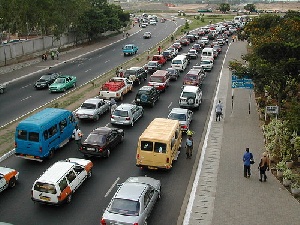The leadership of Ghana Road Transport Coordinating Council (GRTCC) has locked horns with the Commander of Motor Traffic and Transport Unit (MTTU) of the Ghana Police Service, ACP Angwubutoge Awuni, over the proposed implementation of spot fines by the latter.
A consultative meeting organised by the Motor Traffic and Transport Unit [MTTU] of the Ghana Police Service in collaboration with the National Road Safety Commission [NRSC] was nearly marred when the two parties disagreed over the modalities to be adopted in the implementation of the new policy.
According to chairman of the GRTCC, Alhaji Baba Aliyu, the transport operators needed ample time to educate its members about the new policy and to ensure its smooth implementation.
Not convinced with the demands made by Baba Alhaji, the MTTU Boss quickly interrupted and dismissed Baba’s appeal adding that they would implement while the training goes on.
ACP Awuni indicated that the proposed implementation of the spot fine policy, required that Spot Fine Offices [SFO] be established nationwide to provide the day to day administration of the regulations.
He further explained that the SFO as part of its functions will establish Special Traffic Enforcement Teams [TETs] to be stationed mainly in the Regional Capitals within the MTTU operation centers and to also plan, supervise, monitor and coordinate TET activities.
The MTTU Boss cautioned that his officers will not hesitate to apprehend motorists who commit traffic offences prescribed under spot fines and issue Spot Fine Tickets [SFT] to them.
Motorists issued with the SFT would be required to make payments of full amount indicated to the nearest pay point which are the Ghana Commercial Bank, Agricultural Development Bank and the Bank for Africa within 24 hours, he added.
He stressed that a person issued with SFT shall have his or her driving license confiscated and will only be released back to the motorist upon payment of the prescribed fine.
ACP Awuni was confident that the spot fine, when implemented, will not only improve enforcement of prescribed traffic rules but will also ensure increased compliance with road traffic regulations as well as save lives of both motorists and pedestrians.
General News of Thursday, 18 April 2013
Source: The Al-Hajj













